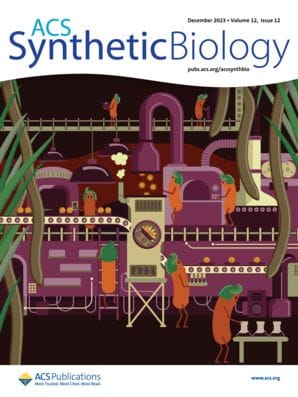Building on the success of a recent Special Issue, and the ever-increasing demand cutting-edge AI techniques applied to synthetic biology research, ACS Synthetic Biology is excited to re-open its Call for Papers on this topic.

AI continues (and will continue) to play a crucial role in synthetic biology by accelerating research and innovation. It enhances the design and optimization of genetic circuits, assists in the prediction of protein structures, and analyzes unwieldy datasets in vastly reduced timescales. AI-driven tools can improve the accuracy and efficiency of gene editing, enabling the creation of custom organisms for medicine, agriculture, and industry. By automating complex tasks and providing deep insights into biological systems, AI can empower scientists to make breakthroughs faster and with greater precision, ultimately advancing the field and its applications.
In this Editorial, Hector García Martín, Stanislav Mazurenko, and Huimin Zhao discuss the papers contained within their recent Special Issue, AI for Synthetic Biology, and speculate on the potential advancements that AI might bring to the field of synthetic biology.

AI for Synthetic Biology
ACS Synthetic Biology is now seeking additional submissions in this topic area! Read on to learn more about how to submit your research.
Building on the success of this Special Issue, ACS Synthetic Biology is excited to re-open its Call for Papers on this topic. The journal seeks submissions of original Research Articles, as well as Reviews and Perspective articles, focused on the cutting-edge of AI techniques and implementations. We also welcome your submissions of Technical Notes, detailing novel AI techniques applied to synthetic biology problems; Technical Notes focused on existing AI tools adapted to solve additional synthetic biology challenges are also in scope, provided they meet ACS Synthetic Biology’s standards and requirements.
Authors are encouraged to adhere to FAIR Data Principles when submitting research.
Relevant topics may include, but are not limited to:
- Open data and machine readability in SynBio research
- Learning from SynBio data faster
- Implementations of generative AI
- Accelerating experimentation through automation
- ML-driven design and discovery
- Combining ML with biophysical modeling
- AI applications in simulations of SynBio systems
Organizing Editors
Hector García Martín, Guest Editor
Lawrence Berkeley National Laboratory, United States
Stanislav Mazurenko, Guest Editor
Masaryk University, Czech Republic
Huimin Zhao, Editor-in-Chief, ACS Synthetic Biology
University of Illinois at Urbana-Champaign, United States
How to Submit
- Log in to the ACS Paragon Plus submission site.
- Choose ACS Synthetic Biology.
- Select your manuscript type, and under "Special Issue Selection," choose “AI for Synthetic Biology."
If you have any general questions regarding submission, please contact Editor-in-Chief Huimin Zhao (eic@synthbiol.acs.org). All manuscripts will undergo the normal peer review process. For additional submission instructions, please see the journal's Author Guidelines page.
Open Access: There are diverse open access options for publications in American Chemical Society journals. Please visit our Open Science Resource Center for more information.

